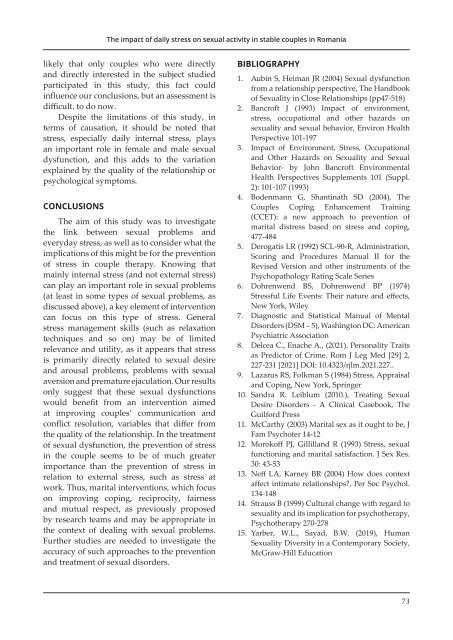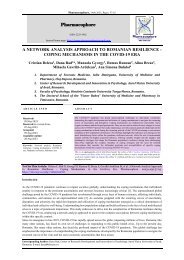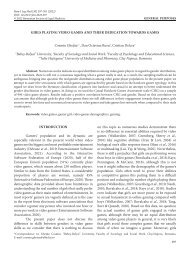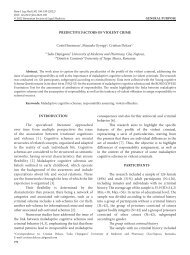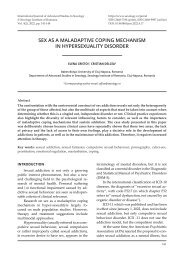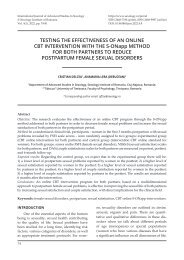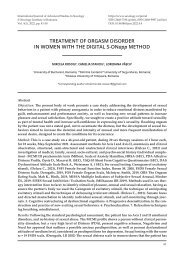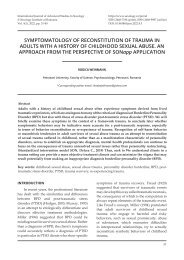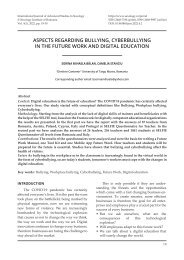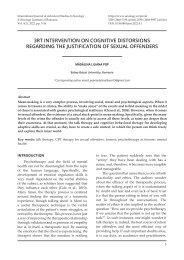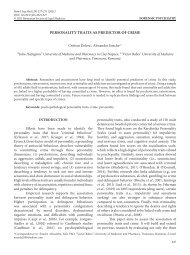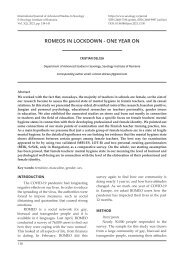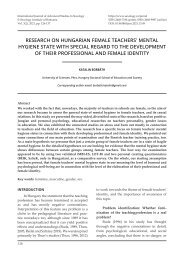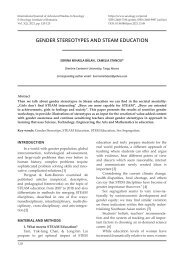THE IMPACT OF DAILY STRESS ON SEXUAL ACTIVITY IN STABLE COUPLES IN ROMANIA
Purpose: This study addresses the issue of how stress is related to sexual problems among women and men in close relationships (we considered stable couples). Psychological symptoms, relationship quality, daily internal stress (meaning, stress that comes from the couple, such as conflicts, concern for the partner), daily external stress (meaning, stress that occurs outside the couple, such as stress at work, stressful relatives and so on) were examined for their association with various sexual problems. Method: The study included 38 couples participating in this study, chosen at random from a sample of sexually active couples. Online questionnaires were used. Results: The results so far support the hypotheses that 1) there is an incremental effect or stress on sexual problems, controlling psychological symptoms and the quality of the relationship and that 2) it is primarily internal daily stress. Emotional stress that is related to sexual problems, especially hypoactive sexual desire in women and men, sexual aversion in women, vaginismus in women and premature ejaculation in men. Conclusions: Our findings indicate that the treatment of these sexual problems should address relationship issues, including a focus on helping individuals to improve their stress management skills in their relationship. Inner stress plays a key role in sexual behavior, this study once again highlights the fact that better communication as a couple, relaxation and finding specific copying methods are a good remedy, but more studies are needed to demonstrate effectiveness. them.
Purpose: This study addresses the issue of how stress is related to sexual problems among women and
men in close relationships (we considered stable couples). Psychological symptoms, relationship quality,
daily internal stress (meaning, stress that comes from the couple, such as conflicts, concern for the partner),
daily external stress (meaning, stress that occurs outside the couple, such as stress at work, stressful
relatives and so on) were examined for their association with various sexual problems.
Method: The study included 38 couples participating in this study, chosen at random from a sample of sexually active couples. Online questionnaires were used.
Results: The results so far support the hypotheses that 1) there is an incremental effect or stress on sexual
problems, controlling psychological symptoms and the quality of the relationship and that 2) it is primarily
internal daily stress. Emotional stress that is related to sexual problems, especially hypoactive sexual
desire in women and men, sexual aversion in women, vaginismus in women and premature ejaculation
in men.
Conclusions: Our findings indicate that the treatment of these sexual problems should address relationship
issues, including a focus on helping individuals to improve their stress management skills in their
relationship. Inner stress plays a key role in sexual behavior, this study once again highlights the fact that better communication as a couple, relaxation and finding specific copying methods are a good remedy, but more studies are needed to demonstrate effectiveness. them.
You also want an ePaper? Increase the reach of your titles
YUMPU automatically turns print PDFs into web optimized ePapers that Google loves.
The impact of daily stress on sexual activity in stable couples in Romania<br />
likely that only couples who were directly<br />
and directly interested in the subject studied<br />
participated in this study, this fact could<br />
influence our conclusions, but an assessment is<br />
difficult. to do now.<br />
Despite the limitations of this study, in<br />
terms of causation, it should be noted that<br />
stress, especially daily internal stress, plays<br />
an important role in female and male sexual<br />
dysfunction, and this adds to the variation<br />
explained by the quality of the relationship or<br />
psychological symptoms.<br />
C<strong>ON</strong>CLUSI<strong>ON</strong>S<br />
The aim of this study was to investigate<br />
the link between sexual problems and<br />
everyday stress, as well as to consider what the<br />
implications of this might be for the prevention<br />
of stress in couple therapy. Knowing that<br />
mainly internal stress (and not external stress)<br />
can play an important role in sexual problems<br />
(at least in some types of sexual problems, as<br />
discussed above), a key element of intervention<br />
can focus on this type of stress. General<br />
stress management skills (such as relaxation<br />
techniques and so on) may be of limited<br />
relevance and utility, as it appears that stress<br />
is primarily directly related to sexual desire<br />
and arousal problems, problems with sexual<br />
aversion and premature ejaculation. Our results<br />
only suggest that these sexual dysfunctions<br />
would benefit from an intervention aimed<br />
at improving couples’ communication and<br />
conflict resolution, variables that differ from<br />
the quality of the relationship. In the treatment<br />
of sexual dysfunction, the prevention of stress<br />
in the couple seems to be of much greater<br />
importance than the prevention of stress in<br />
relation to external stress, such as stress at<br />
work. Thus, marital interventions, which focus<br />
on improving coping, reciprocity, fairness<br />
and mutual respect, as previously proposed<br />
by research teams and may be appropriate in<br />
the context of dealing with sexual problems.<br />
Further studies are needed to investigate the<br />
accuracy of such approaches to the prevention<br />
and treatment of sexual disorders.<br />
BIBLIOGRAPHY<br />
1. Aubin S, Heiman JR (2004) Sexual dysfunction<br />
from a relationship perspective, The Handbook<br />
of Sexuality in Close Relationships (pp47-518)<br />
2. Bancroft J (1993) Impact of environment,<br />
stress, occupational and other hazards on<br />
sexuality and sexual behavior, Environ Health<br />
Perspective 101-197<br />
3. Impact of Environment, Stress, Occupational<br />
and Other Hazards on Sexuality and Sexual<br />
Behavior- by John Bancroft Environmental<br />
Health Perspectives Supplements 101 (Suppl.<br />
2): 101-107 (1993)<br />
4. Bodenmann G, Shantinath SD (2004), The<br />
Couples Coping Enhancement Training<br />
(CCET): a new approach to prevention of<br />
marital distress based on stress and coping,<br />
477-484<br />
5. Derogatis LR (1992) SCL-90-R, Administration,<br />
Scoring and Procedures Manual II for the<br />
Revised Version and other instruments of the<br />
Psychopathology Rating Scale Series<br />
6. Dohrenwend BS, Dohrenwend BP (1974)<br />
Stressful Life Events: Their nature and effects,<br />
New York, Wiley<br />
7. Diagnostic and Statistical Manual of Mental<br />
Disorders (DSM – 5), Washington DC: American<br />
Psychiatric Association<br />
8. Delcea C., Enache A., (2021). Personality Traits<br />
as Predictor of Crime. Rom J Leg Med [29] 2,<br />
227-231 [2021] DOI: 10.4323/rjlm.2021.227..<br />
9. Lazarus RS, Folkman S (1984) Stress, Appraisal<br />
and Coping, New York, Springer<br />
10. Sandra R. Leiblum (2010.), Treating Sexual<br />
Desire Disorders - A Clinical Casebook, The<br />
Guilford Press<br />
11. McCarthy (2003) Marital sex as it ought to be, J<br />
Fam Psychoter 14-12<br />
12. Morokoff PJ, Gillilland R (1993) Stress, sexual<br />
functioning and marital satisfaction. J Sex Res.<br />
30: 43-53<br />
13. Neff LA, Karney BR (2004) How does context<br />
affect intimate relationships?, Per Soc Psychol.<br />
134-148<br />
14. Strauss B (1999) Cultural change with regard to<br />
sexuality and its implication for psychotherapy,<br />
Psychotherapy 270-278<br />
15. Yarber, W.L., Sayad, B.W. (2019), Human<br />
Sexuality Diversity in a Contemporary Society,<br />
McGraw-Hill Education<br />
73


